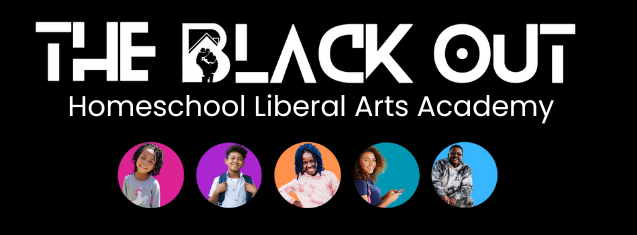Academy Policies
2025-2026 Academic Year
Eligibility:
The BlackOut Liberal Arts Academy seeks to create a diverse and dynamic learning community. We welcome applications from students who meet the following criteria:
Age and Grade Level:
We enroll students who will typically be in grades 6-12 in our Intermediate (IM, ages 11-13), Lower High School (LHS, ages 13-15) and Upper High School (UHS, ages 15-18) programs. Students between the ages of 18-20 will be enrolled in our Rising Adult Pathways (RAP) program.
However, we recognize that age and grade level are not always the best indicators of a student's readiness or potential. We are open to considering students outside of these ranges if they demonstrate a strong fit with our educational philosophy and have success in our learning environment.
Parent/Guardian Partnership Policy:
Background Check Requirement:
For the safety of all students, The BlackOut requires all parents/guardians who wish to volunteer or chaperone school events to undergo a background check.
This process will involve submitting personal information for a criminal background check through a secure 3rd party website.
The school reserves the right to deny participation to any individual whose background check reveals information that may pose a risk to student safety.
Progress Meetings
Ideology
The BlackOut Liberal Arts Academy thinks of each educational year/segment as a Stairway to the pinnacle of success. Each step is a lesson learned, bringing you closer to your goal.
Landings are like pauses to reflect and prepare for the next climb. The journey itself is valuable, with each step offering growth and self-discovery.
A solid foundation, a clear path, and collaborative guidance from teachers and parents are crucial.
Requirement
We believe in a collaborative approach to assessing student progress. As such, parents are asked to attend mandatory quarterly progress meetings with their child’s educational team.
Note: We may occasionally limit or postpone classroom observations due to special events or circumstances. We appreciate your understanding.
Grading Policy:
At the BlackOut Liberal Arts Academy, our core model of grading is rubric style. Coursework. Rubric-style grading supports our commitment to open communication, empowering parents and students to have meaningful discussions about academic progress. It provides a clear framework for evaluating performance while valuing student self-reflection and encouraging collaborative conversations about their learning journey.
For Educators:
Rubric-style grading is a method of evaluating student work that goes beyond simple letter grades or numerical scores. It provides a detailed framework for assessing various aspects of student performance and helps ensure consistency and fairness in grading.
Here are the essential steps to take in creating a grading rubric.
Identifying Criteria: The first step is to identify the specific skills, knowledge, or behaviors you want to assess in a particular assignment or project. These criteria could include things like critical thinking, creativity, communication skills, organization, or mastery of specific content.
Developing Descriptors: For each criterion, you create a set of descriptors that define different levels of performance. These descriptors should be clear, specific, and observable so that both the teacher and the student understand what constitutes excellent, proficient, developing, or unsatisfactory work.
Creating a Grid: The criteria and descriptors are then organized into a grid or table, forming the rubric. Each row represents a criterion, and each column represents a level of performance.
Assessing Student Work: When grading, the educator matches the student's work to the appropriate descriptors in each criterion, assigning a score or level for each aspect of the assignment. This allows for a more nuanced evaluation than simply giving an overall grade.
For Parents and Students, benefits of Rubric-Style Grading:
Transparency: Rubrics make the grading criteria explicit, helping students understand what is expected of them and how their work will be evaluated.
Consistency: Rubrics provide a standardized framework for grading, reducing subjectivity and ensuring that all students are assessed fairly.
Feedback: Rubrics offer detailed feedback on specific strengths and weaknesses, guiding students in their learning and improvement.
Self-Assessment: Rubrics can be used by students to self-assess their work, promoting metacognition and self-regulation.
Differentiation: Rubrics can be adapted to accommodate different learning styles and levels of proficiency.
Focus on Learning: Rubric-style grading shifts the focus from simply achieving a grade to understanding the learning process and mastering specific skills and knowledge while continuing to enforce high-quality work in preparation for syllabus style collegiate-level.
Social and Emotional Development:
We believe that social and emotional well-being is essential for academic success and personal growth. We seek students who are kind, empathetic, and respectful of others.
We encourage students to develop strong communication and interpersonal skills, as well as a sense of self-awareness and emotional regulation.
We value students who are resilient, adaptable, and able to navigate challenges with a positive attitude.
Alignment with Our Philosophy:
We seek students and families who are aligned with our educational philosophy, which emphasizes personalized learning, student-centered instruction, and a focus on real-world skills and experiences.
We believe in fostering a close-knit community of learners, where students feel supported, challenged, and inspired to reach their full potential.
We value diversity in all its forms and strive to create an inclusive and welcoming environment for all students.
Additional Considerations:
We may consider students who have been homeschooled, attended traditional schools, or have unique educational backgrounds.
We welcome students from all socioeconomic backgrounds and strive to make our program accessible to all families.
We may conduct additional assessments or interviews to determine a student's fit with our program.
This eligibility guideline aims to provide a more comprehensive understanding of the qualities and characteristics we value in our students. We believe that by carefully considering each applicant's individual profile, we can create a vibrant and enriching learning community for all.
Application Process:
Submit an online application form, including student information and parent/guardian contact details.
Schedule a family meet and greet to discuss the student's interests, learning style, and goals.
Provide previous school records (if applicable) and any relevant assessment reports.
If accepted, submit the enrollment agreement and non-refundable deposit to secure your child's spot.
Admissions Decisions:
"Admissions decisions are based on a holistic review of the application, interview, and school records. We seek students who are a good fit for our unique learning model and demonstrate a strong desire to learn and contribute to our community."
Waitlist:
"If our program is full, applicants will be placed on a waitlist. Waitlisted applicants will be notified if a spot becomes available, based on the date of application and our enrollment priorities."
Enrollment Policies
Enrollment Agreement:
This agreement outlines the terms and conditions of enrollment, including:
Tuition fees and payment schedule
Withdrawal policy and refund schedule
Parent/guardian responsibilities
Agreement to abide by the school's code of conduct and policies
Code of Conduct:
Our micro-school promotes a positive and respectful learning environment. Students are expected to:
Respect themselves, their peers, and all staff members.
Follow school rules and instructions.
Refrain from bullying, harassment, or any form of discrimination.
Use technology responsibly and appropriately.
Consequences for violating the code of conduct may include:
Verbal warning
Loss of privileges
Parent/guardian conference
Suspension or expulsion
Attendance:
"Regular attendance is essential for academic progress and community building. Students are expected to attend all scheduled classes and activities. Absences must be reported to the school in advance, and documentation may be required."
Health and Safety:
"The health and safety of our students are paramount. We require proof of immunization for all students, and parents must inform us of any allergies or medical conditions. We have procedures in place for medication administration, emergency situations, and COVID-19 protocols."
Payment Policy Key Points:
- Non-Refundable Current Month: We do not offer refunds for the current month's subscription payment.
- 7-Day Exchange Window: You have 7 days from the course start date to exchange it for another one.
- Cancel by the 25th: To avoid next month's charge, cancel before the 25th at 11:59 PM.
- Subscription Renewals: Independent Study and 3-Course Bundle subscriptions renew automatically on your renewal date.
- Academy Payments Due 15th: Payments for other Academy courses are due on the 15th of each month.
Academy Withdrawal Policy: To withdraw your child from the academy, please provide a two-week written notice. You will receive a prorated refund within seven business days of your notice.
- 7-Day Grace Period: You have a 7-day grace period for late payments.
- Need Help? Contact Us: If you need to make a late payment or have other billing questions, contact billing@theblackout.academy.
Academic Policies
Curriculum:
"Our curriculum is designed to be engaging, relevant, and personalized to each student's needs and interests. We use a project-based learning approach, emphasizing critical thinking, creativity, and collaboration. Our teachers are passionate experts in their fields and committed to fostering a love of learning in every student."
Grading:
"We use a narrative assessment system that provides detailed feedback on each student's strengths, challenges, and progress. Progress reports are shared with parents/guardians regularly, and conferences are held to discuss individual student goals and learning plans."
Special Education:
"We are committed to providing a supportive and inclusive learning environment for all students. We work with parents/guardians to identify and support students with special needs through individualized learning plans, accommodations, and specialized services. If we do not have the appropriate tools to place your student, we will assist you in finding alternatives."
Homework:
"We believe homework should be meaningful and relevant to each student's learning. We strive to keep homework assignments to a minimum, focusing instead on in-class learning activities and projects."
Other Policies
Technology:
"Students may use school-provided devices for educational purposes only. Personal devices are allowed during designated times and must be used responsibly. We monitor internet usage and have strict policies against cyberbullying and inappropriate online behavior."
Field Trips:
"Field trips are an integral part of our learning experience. We organize regular field trips to museums, parks, businesses, and other educational destinations. Parents/guardians must sign permission slips, and chaperones are required to follow our field trip guidelines."
Complaints and Grievances:
"We value open communication and strive to resolve any concerns or complaints promptly and fairly. If you have a concern, please contact your child's primary educator and the Head of School. We have a formal grievance process in place for unresolved issues."
Confidentiality:
We protect the confidentiality of all student and family information. We comply with all applicable privacy laws and only share information with authorized individuals on a need-to-know basis.
The BlackOut Liberal Arts Academy reserves the right to modify, amend, or revise any of its policies at any time, with or without prior notice. Any changes to the policies will be communicated to parents/guardians in a timely manner through the school's website, email, or other appropriate channels. Continued enrollment in the school after any policy changes constitutes acceptance of the revised policies.


